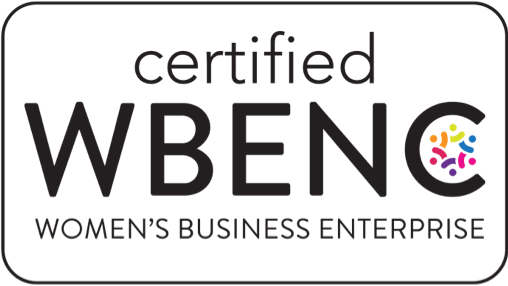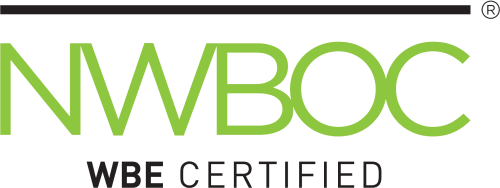Report
Why Gen Z is a retention outlier—and what to do about it

Increasing power, negative perceptions
Gen Z is the fastest growing generation in the workforce and retaining them is critical to future success. This generation, born after 1996, is projected to outnumber Baby Boomers in the full-time workforce this year, according to Glassdoor, and the World Economic Forum expects that Gen Z will make up 27% of the workforce in 2025.
While Gen Z is known for being digitally savvy, purpose driven, and globally minded, they are also perceived as needy, quick to jump ship, and without a strong work ethic. These perceptions can impact their treatment at work. In fact, 31% of hiring managers avoid hiring Gen Z candidates because they think Gen Zers ask for too much money, act entitled, and communicate poorly, according to a Resume Builder survey.
The Gen Z retention story
Every generation is a product of its unique experience. Digital ubiquity, the pandemic, and longtime economic uncertainty have shaped Gen Z’s behaviors and expectations at work. Take retention, for example. Trends across the Eagle Hill Consulting Employee Retention Index reveal that compared to other generations, Gen Z has a very different experience of the factors that influence employees’ intent to stay or leave their job.
Our research finds that organizations need specific employee retention strategies to engage Gen Z workers on their terms. Here’s what we learned:
The Employee Retention Index provides early signals of changes in workforce turnover by monitoring U.S. worker sentiment across four proven drivers of employee retention:
- Organizational Confidence
- Culture
- Compensation
- Job Market Opportunity
Gen Z is an employee retention outlier
When we began tracking the drivers of employee retention in 2023, Gen Z’s Retention Index score (110.3) was among the highest recorded to date. Meaning, they were among the least likely workers to leave their jobs. Since this strong showing, Gen Z’s overall sentiment sat below other generations for nearly a year, until surging back up this quarter.
The Retention Index is tremendously volatile for Gen Z workers. It dropped dramatically between Q1-23 and Q3-23, leveled out for the next quarter, and then began a dramatic upswing in Q1-24. While this upswing continues today, Gen Z’s Q2-24 score (107.4) has yet to match its Q1-23 high. Across the last year, Gen X is the only generation to have a weaker Retention Index score than Gen Z.
Figure 1: Gen Z workers’ Employee Retention Index is volatile
Gen Z workers’ confidence in their organization’s future and its leadership is on the rise.
Gen Z’s Organizational Confidence indicator tracked closely with Millennials’ and Baby Boomers’ in mid-2023. However, it plummeted by the last quarter, falling 23.1 points from the beginning to the end of the year. The upward trend that began in 2024 continues today. The Confidence indicator jumped 4.3 points between Q4-23 and Q1-24 and nearly 20 points between Q1-24 and Q2-24. This upswing mirrors the overall Retention Index, reinforcing the close connection between Gen Z’s feelings of confidence in their organization’s future and leadership and their desire to stay there.
Figure 2: Gen Z’s confidence is on the upswing after having the lowest confidence for two consecutive quarters
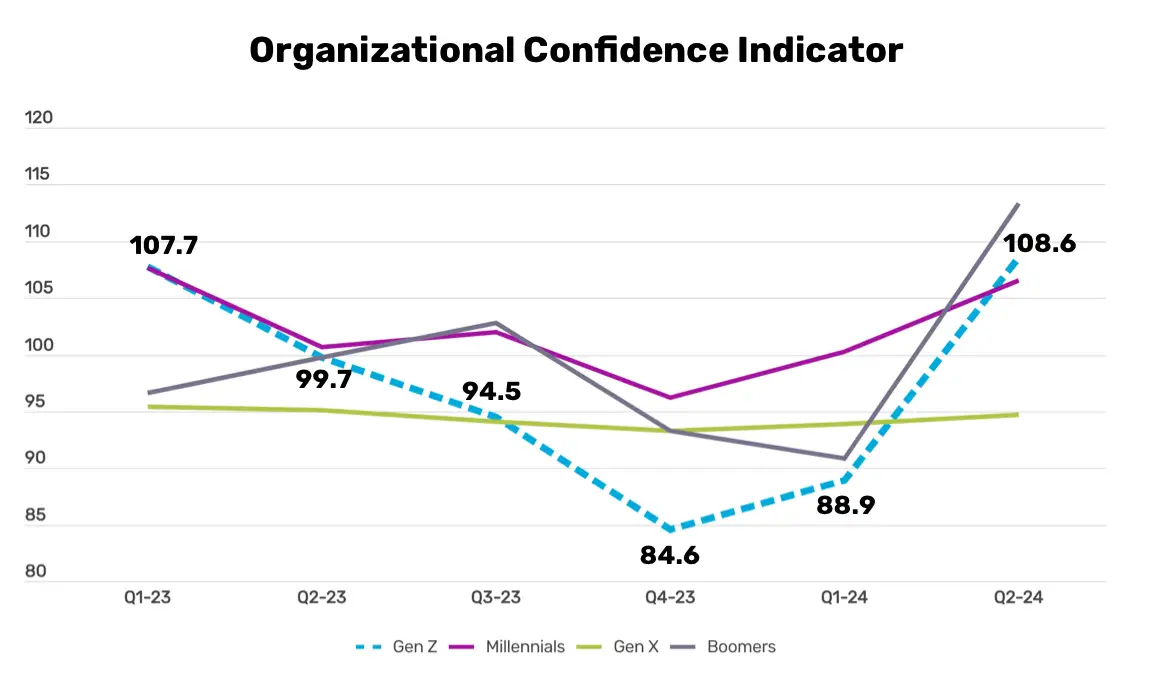
Of all the indicators of retention, Gen Z workers are the most dissatisfied with culture.
When comparing Gen Z’s perceptions across all four indicators of retention, Culture has consistently been the weakest. For a generation that seeks meaning and purpose at the workplace, Gen Z’s relative pessimism toward their workplace culture is especially troubling.
Gen Z held the leading position in the Culture indicator in Q1-23. But it didn’t stay this way. Gen Z sentiment plummeted between Q1-23 and Q2-23 and hasn’t fully recovered. Steadily declining for the rest of 2023, Gen Z’s perception of their organizational culture remained among the lowest of all other generations. This was until Q1-24, when Baby Boomer sentiment took a nosedive to meet it. Most recently, Gen Z’s perception of culture have improved. The Culture indicator surged over the last two quarters, jumping 14 points between Q1-24 and Q2-24.
Figure 3: Gen Z’s view of culture is comparatively lower than other generations’
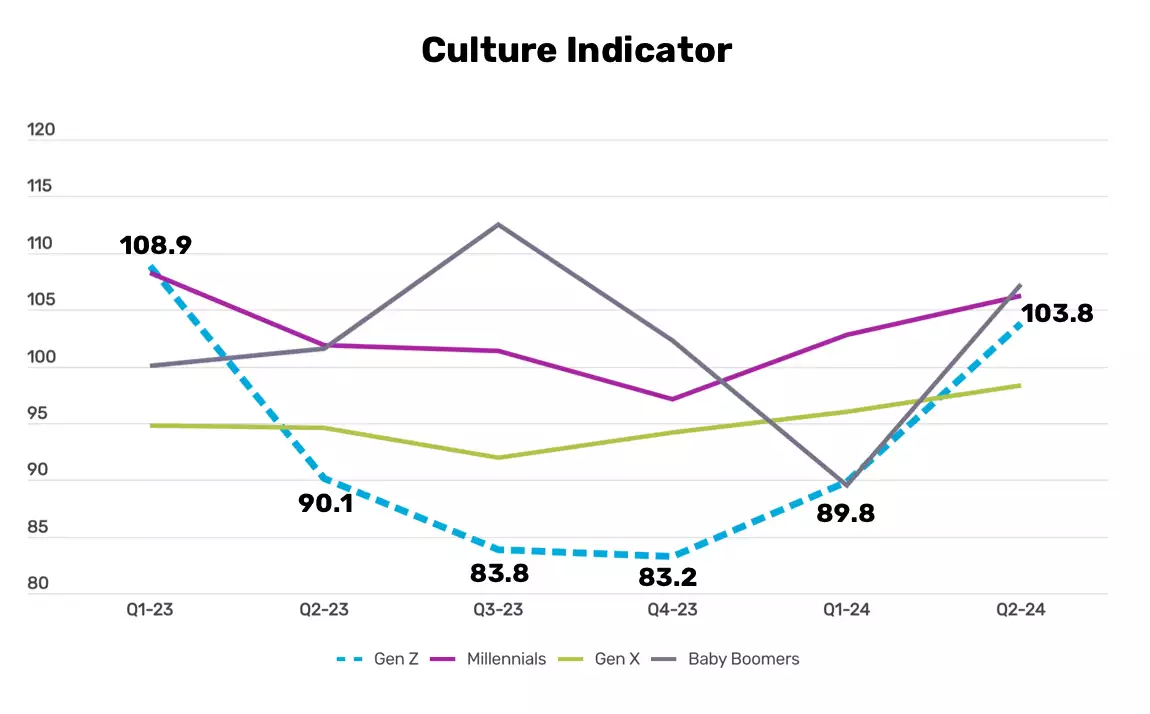
Dissatisfaction with compensation isn’t the primary driver pushing Gen Z workers to leave their jobs.
Despite perceptions that Gen Zers have inflated compensation demands, Gen X and Baby Boomer employees are the most pessimistic about their compensation. In fact, Gen Z reported the strongest sentiment toward Compensation to date, at 120.2 in Q1-23. Like their overall Retention Index and Culture indicator scores, Gen Z’s optimism around their compensation dropped precipitously between Q1-23 and Q2-23. It flattened out over the next quarter before rising steadily between Q3-23 and Q4-23. While the Compensation indicator dipped in early 2024, it then rose sharply, reaching 115.5 in Q2-24.
Figure 4: Gen Z is relatively satisfied with their compensation
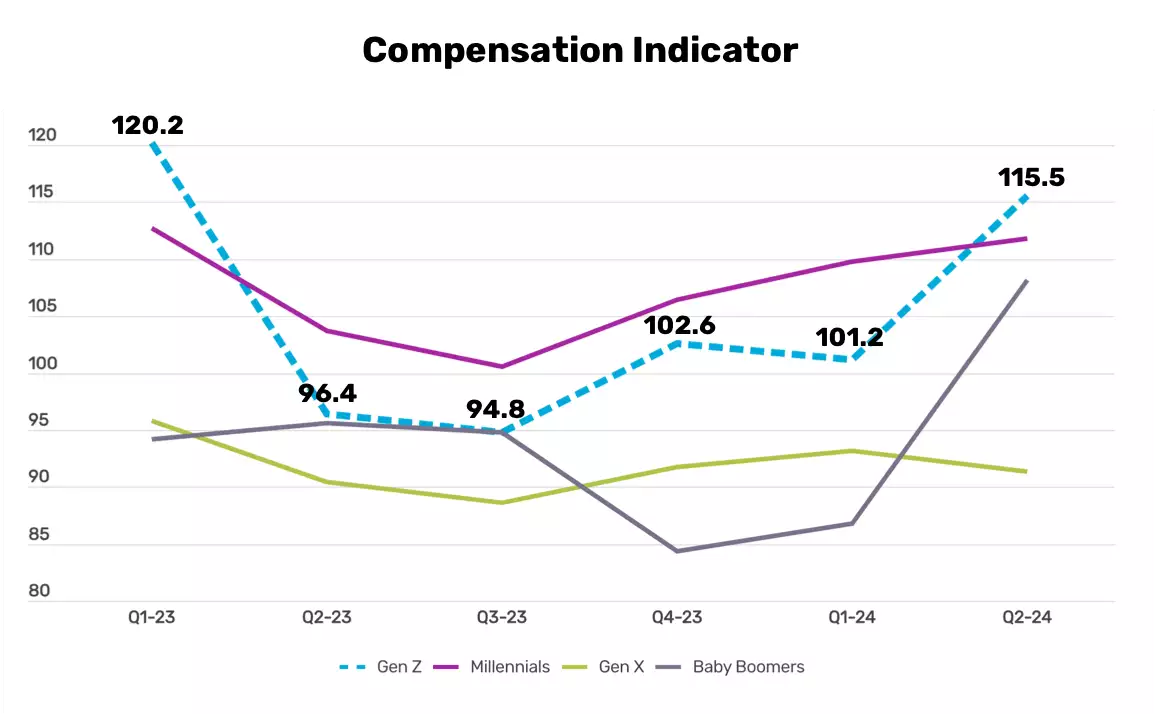
Gen Z workers are the most optimistic generation in near-term employment prospects and job security.
Gen Z workers feel most optimistic about the job market. Their Job Market Opportunity indicator has been higher than all other generations—an average of 108.6. Even at its weakest score (103.7 in Q4-23), Gen Z’s confidence in the job market still outpaces Baby Boomers’ highest score by 11.2 points and Gen X’s peak score by 3.4 points. Only Millennials’ optimism about the job market has matched Gen Z’s, once in Q4-23.
Gen Z’s consistent strength in the Job Market Opportunity Indicator suggests that one reason Gen Z workers are willing to leave their job is because they are the most confident about the market and their ability to find opportunities outside their current employer.
Figure 5: Gen Z workers are more optimistic about the job market than other generations
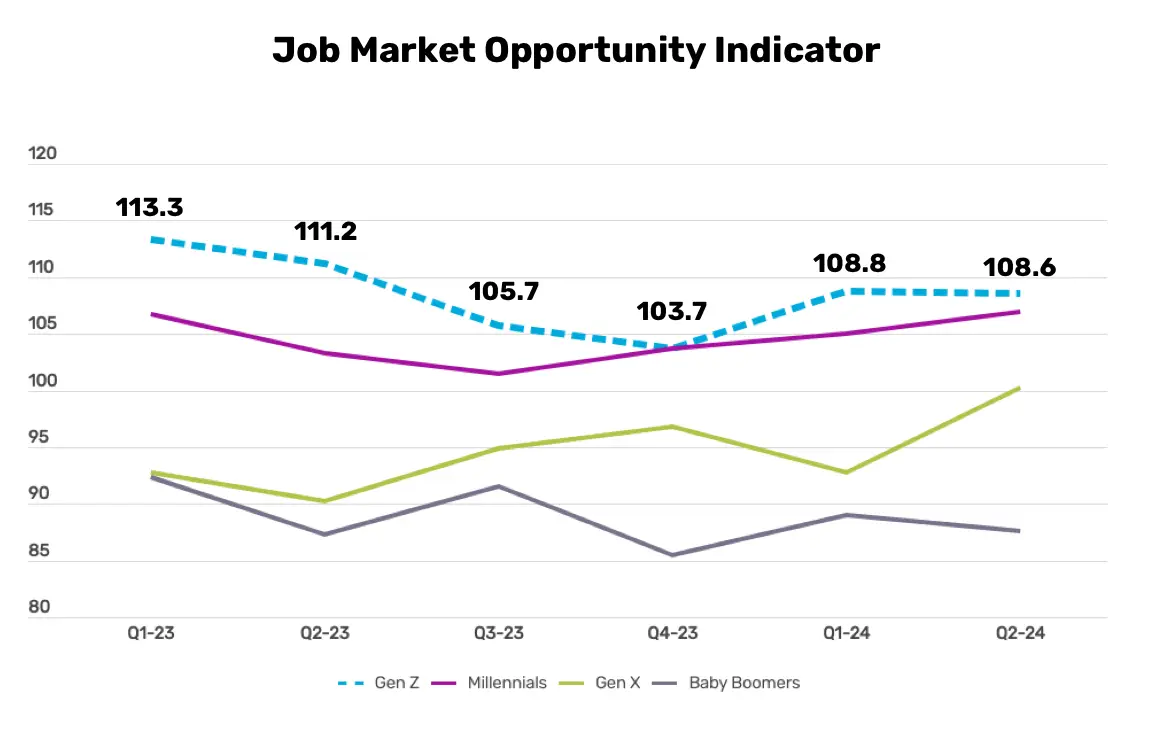
How to influence Gen Z retention
The Culture and Organizational Confidence indicators are clearly the lowest for Gen Z workers. Eagle Hill’s extensive research reveals what matters most to Gen Zers in these areas. Based on this insight, employers should focus first on these five priorities to influence Gen Z retention:

Create a flexible work environment with a strong culture. According to our research, workplace flexibility is much more important to younger workers. Sixty percent of Gen Z workers would look for other employment if remote work were scaled back while just 47% of the overall workforce would. Given that culture is so key for this generation, employers should take steps to build culture in ways that work in hybrid and remote settings.

Support employee mental health well-being holistically. Worker burnout is highest among Gen Zers with 54% reporting burn out, compared to an overall average of 45%. Gen Z workers are also the most likely to say they haven’t taken time off in the last 12 months (46%). The biggest causes Gen Z cites for their burnout are lack of work-life flexibility, communication, support, and feedback. Creating a more flexible work environment with a performance culture that prioritizes development, clearly articulates expectations and encourages collaboration is key to addressing these issues.

Respect how central tech is to the Gen Z experience. Gen Z’s digital savvy influences every aspect of their experience at work. For example, our research shows that Gen Z is more likely than Gen X (2x) and Boomers (5x) to say that coming technology change at work will decrease their stress. With Generative AI a massive force of change in the workplace, it will be especially important for organizations to consider AI adoption through a Gen Z lens.

Insist on building a culture of belonging and inclusion. Gen Z workers seek out inclusive work environments where they feel respected, valued, and can be their authentic selves. In fact, 77% of Gen Z workers (compared to 53% overall) say that when considering who they work for, a company’s inclusion strategies are a key factor in their decision.

Champion career growth through internal opportunities. Our research on internal mobility shows that nearly half of younger workers are concerned about negative repercussions if they openly express interest in new roles within their organization. This is why it’s critical for leaders to be positive ambassadors of internal mobility and build a culture that encourages—and expects—it.
Methodology
The Eagle Hill Consulting Employee Retention Index is the first of its kind. The Index is based on a monthly omnibus survey conducted by IPSOS of a nationally representative sample of U.S. adults employed full or part time. Quarterly indices and reports are issued based on a minimum of 1,200 aggregated responses per quarter. Respondents are polled on a range of workforce topics including organizational confidence, culture, compensation, and job market opportunity, which compose the Index’s four indicators.
